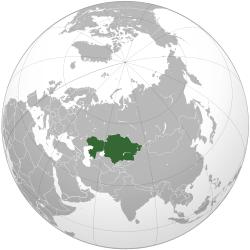Kazakhstan: Transition To Multi-Party System? – Analysis
By JTW
By Gulay Mutlu
Upon the termination of the Kazakh parliament by Nursultan Nazarbayev on November 16, 2011, elections have been decided to be held seven months earlier, on January 15, 2012. 98 seats of the 107-member parliament will be directly determined by the vote of the electorate. The remaining nine deputies will take their place in parliament after the submission of candidates determined by the People’s Assembly of Kazakhstan to the President on January 16.
Up until today, several steps were taken to transition to a multi-party parliamentary structure in Kazakhstan. Recently, in 2007, the Nur Otan Democratic People’s Party received 88.05 percent of the vote and became the only party which met the 7 percent threshold requirement according to election laws. Other parties that entered the election were left outside the parliament because they could not exceed the threshold. Then, in order to carry the parliament into a multi-party structure, the decision was taken in the constitution to allow the party which got the second most votes representation in the parliament even though it could not exceed the threshold.

The parties that will compete in elections to be held on January 15 are the Nur Otan Democratic People’s Party, Democratic Party of Adilet, Kazakhstan Communist Party and the Ak Zhol Democratic Party of Kazakhstan. However, eight parties have applied to the Kazakhstan Central Election Commission yet four other parties could not be registered for reasons such as a lack of documents and candidates. These parties are the Auyl Kazakhstan Social Democratic Party, Rukhaniyat Party, Azat Social Democratic Party and National Party Alga.
According to opinion polls, Nur Otan, of which President Nursultan Nazarbayev is the founder and still appears to be the head, is expected to come as the first party with 80.9 percent of the vote and the second party will be Ak Zhol.
Coming to its twentieth year of independence, the one-party parliament of Kazakhstan was seen as legitimate by the government within the understanding of maintaining stability and preventing chaos and turmoil. Holding the OSCE presidency in 2010, Kazakhstan took over the presidency of the Islamic Cooperation Organization in 2011. The election that will be held on January 15 is the perambulator of the democratization phenomenon which has become inevitable for Kazakhstan. Moreover, expectations for Kazakhstan in the international community are in this direction.
Some events that erupted in the country indicate the need for the opposition. At the eventual strike on December 16, 2011, coinciding with the day of Kazakhstan’s independence celebration, at Zhanaozen, workers of the Ozenmunaygaz Oil Company clashed with police. According to official figures, 14 people had died in conflicts as a result of the inequitable distribution of wealth. Nazarbayev said that the problems of workers will be solved and declared a state of emergency in the region until the last day of January.
Nazarbayev expressed in an interview he gave to RIA Novosti that the transition to a multi-party system has become necessary for the country, stating that Nur Otan represents many different political movements, but admits that it is still considered inadequate. He adds that a multi-party structure is a constitutional provision and carrying out this provision became effective in the cancellation of parliament on November 16, 2011. Second, he propounds that an economic crisis is expected in 2012 and parliament should take policy measures to deal with the crisis rather than focus on elections. Third, he explains that the government has formed a strong industrialization program for Kazakhstan that will be beneficial for every citizen, so the deputies who will be elected should make new laws that will not hinder this program. The reasons specified by Nazarbayev show that there is a need of a parliament working for the continued prosperity and stability of the country. However, this program seems to be sustained religiously only with the existence of an opposition that does not block the execution of the project while revealing its own ideas.
Symbolizing the stability and development in Central Asia, Kazakhstan’s transition to a multi-party parliamentary system will set an example in the region. However in the first stage, it should be noted that this is a transition period. According to some circles, we should not expect the party which will enter the parliament to really criticize or use votes against the government’s policies. Hence according to the Nazarbayev administration the first step of democratizing the political system is transitioning to a two-party system without disturbing the stability. As a result, the government wants the second party to be unobtrusively dissident, in a sense to be pro-government, in order to not transform the parliamentary election into a struggle for seats. In this context, the Ak Zhol and Adilet parties suit the portrayal.
Today, a liberal democracy is regarded as the highest stage of the socio-cultural evolution of humanity. Recognizing the necessity of change in this direction, the government should take steps supporting these reforms in the long term. Otherwise, with twenty years of political experience, Kazakhstan will face a serious risk of falling into oligarchy if it tries to execute the system without subjecting itself to reforms.
Translated by Nihal Cizmecioglu.
